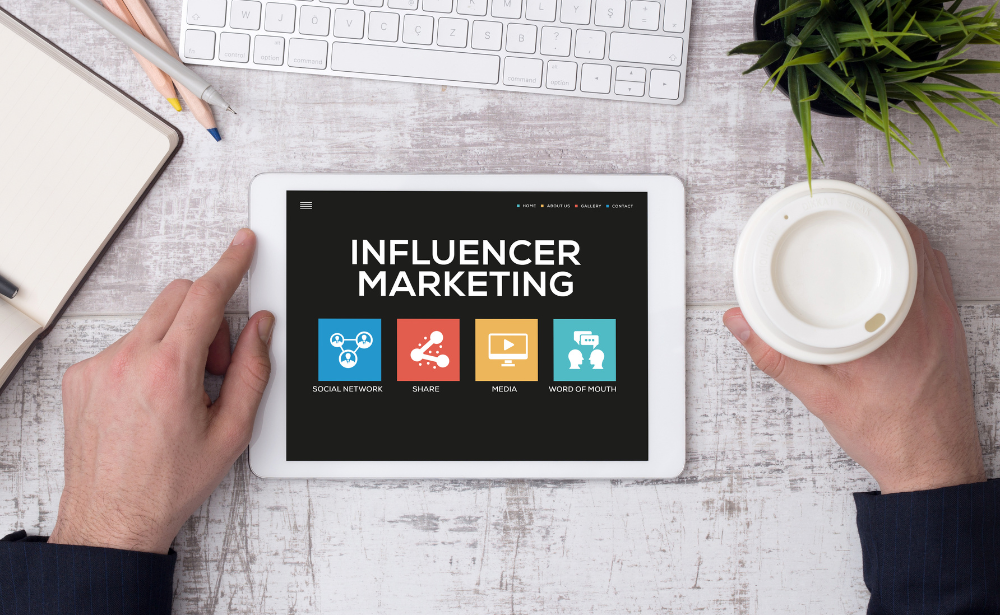Influencer marketing has become a powerful tool for businesses looking to expand their reach, build brand awareness, and drive sales. By partnering with individuals with a strong and engaged following, brands can tap into new audiences and leverage the credibility of influencers.
This guide will help you understand the power of influencer marketing and provide actionable steps to get started.
What is Influencer Marketing?
Definition and Importance
Influencer marketing involves collaborating with influencers who have a significant and engaged following on social media or other online platforms to promote your products or services. The key benefits of influencer marketing include:
- Enhanced Brand Awareness: Influencers can introduce your brand to a broader audience.
- Increased Trust: Followers trust influencers’ recommendations, which can lead to higher conversion rates.
- Targeted Reach: Influencers often have niche audiences, allowing for precise targeting.
Types of Influencers
There are various types of influencers, each with different reach and engagement levels. Understanding these categories can help you choose the right influencers for your campaign:
- Mega-Influencers: Individuals with over a million followers. They have a vast reach but may have lower engagement rates.
- Macro-Influencers: Individuals with 100,000 to 1 million followers. They offer a good balance of reach and engagement.
- Micro-Influencers: Individuals with 10,000 to 100,000 followers. They typically have high engagement rates and are seen as more relatable.
- Nano-Influencers: Individuals with fewer than 10,000 followers. They have the highest engagement rates and are seen as highly authentic.
Benefits of Influencer Marketing
Building Trust and Credibility
Influencers have built a strong rapport with their followers, making their recommendations highly trusted. When an influencer endorses your product, it can significantly enhance your brand’s credibility.
Reaching Targeted Audiences
Influencers often cater to specific niches, allowing you to reach a highly targeted audience. This targeted approach can lead to better engagement and higher conversion rates.
Improving Content Quality
Collaborating with influencers can also improve the quality of your content. Influencers are often skilled content creators who can produce high-quality photos, videos, and posts that align with your brand’s aesthetic.
Boosting SEO
Influencer marketing can also boost your search engine optimization (SEO) efforts. Influencers often link to your website or social media profiles, increasing your online visibility and improving your search engine rankings.
Steps to Get Started with Influencer Marketing
Define Your Goals
Before diving into influencer marketing, it’s crucial to define your goals. Common objectives include:
- Increasing Brand Awareness: Reaching new audiences and making your brand more recognizable.
- Driving Sales: Converting influencer followers into customers.
- Enhancing Engagement: Increasing likes, comments, shares, and overall interaction with your content.
- Growing Your Social Media Following: Attracting new followers to your brand’s social media profiles.
Identify the Right Influencers
Finding the right influencers is key to a successful campaign. Here’s how to identify them:
- Research: Use social media platforms, influencer databases, and industry blogs to find potential influencers.
- Check Engagement Rates: Look for influencers with high engagement rates (likes, comments, shares) relative to their follower count.
- Align with Your Brand: Ensure the influencer’s values, style, and audience align with your brand.
- Analyze Past Collaborations: Review their previous brand partnerships to see how well they performed.
Establish a Budget
Influencer marketing can vary greatly in cost, depending on the influencer’s reach and engagement. Establish a budget that aligns with your goals and consider the following:
- Influencer Fees: Compensation for the influencer’s work.
- Content Creation Costs: Costs associated with producing high-quality content.
- Promotion Costs: Additional costs for boosting or promoting posts.
Develop a Strategy
A well-defined strategy is crucial for a successful influencer marketing campaign. Consider these elements:
- Campaign Theme: Decide on the overall theme or message of your campaign.
- Content Guidelines: Provide clear guidelines for the type of content you want the influencer to create.
- Call to Action: Define what action you want the audience to take (e.g., visit your website, make a purchase, follow your profile).
Reach Out to Influencers
When reaching out to influencers, personalize your communication. Here are some tips:
- Introduce Your Brand: Provide a brief introduction to your brand and why you think the influencer is a good fit.
- Explain the Campaign: Outline the campaign details, including goals, timeline, and compensation.
- Highlight Benefits: Explain how the collaboration will benefit the influencer (e.g., exclusive products, compensation, exposure).
Create Compelling Content
Work closely with influencers to create content that resonates with their audience while aligning with your brand. Consider the following:
- Authenticity: Allow influencers to create content in their own voice and style.
- Variety: Utilize different content formats, such as photos, videos, stories, and live streams.
- Engagement: Encourage influencers to engage with their followers in the comments and through direct messages.
Monitor and Analyze Performance
Tracking the performance of your influencer marketing campaign is essential. Use these metrics to measure success:
- Engagement: Likes, comments, shares, and saves on influencer posts.
- Reach: The number of people who saw the content.
- Traffic: Website visits generated from influencer content.
- Sales: Conversions and sales attributed to the campaign.
- Follower Growth: Increase in your social media followers.
Adjust and Optimize
Based on your analysis, make necessary adjustments to optimize your campaign. Consider the following:
- Feedback: Gather feedback from influencers and their followers.
- Performance Metrics: Adjust your strategy based on what’s working and what’s not.
- Long-Term Relationships: Build ongoing relationships with successful influencers for future collaborations.
FAQs
What is influencer marketing?
Influencer marketing involves partnering with individuals who have a strong following on social media or other online platforms to promote your products or services.
How do I find the right influencers for my brand?
Research potential influencers, check their engagement rates, ensure they align with your brand values, and analyze their past collaborations.
How much does influencer marketing cost?
The cost varies depending on the influencer’s reach and engagement. Establish a budget including influencer fees, content creation, and promotion expenses.
What metrics should I track in an influencer marketing campaign?
Track engagement, reach, traffic, sales, and follower growth to measure the success of your campaign.
How can I ensure the content created by influencers is effective?
Allow influencers to create authentic content in their own voice and style, use a variety of content formats, and encourage engagement with their followers.
Conclusion
Influencer marketing is a powerful tool that can help you reach new audiences, build trust, and drive sales. You can create successful influencer marketing campaigns by defining your goals, identifying the right influencers, developing a strategy, and monitoring performance.
Remember to prioritize authenticity and build genuine relationships with influencers to maximize the impact of your efforts.







